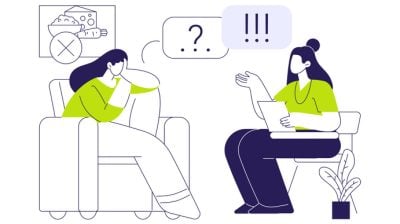Why do people develop eating disorders?
Learn more about who is most at risk of developing an eating disorder and why.

Eating disorders are complex mental health conditions, so it can be scary to think that you or someone you care about might have an eating disorder. However, eating disorders are treatable conditions where full recovery is possible. With appropriate help and support, people can and do recover from eating disorders.
Before reading this article, you might find it helpful to start with our articles on the different types of eating disorders.
In this article, you will find answers to your questions on the many different reasons behind eating disorders, including:
Why do people develop eating disorders?
Who can develop an eating disorder?
How do eating disorders affect the brain?
How do I know if I have an eating disorder?
Why do people develop eating disorders?
No one knows for sure what causes eating disorders. There is no single cause of an eating disorder. Different sets of experiences and factors can lead to the development of an eating disorder. No two eating disorders are the same. However, two of the biggest risk factors for developing an eating disorder are body image dissatisfaction and dieting.
Eating disorders may seem like they’re all about food and body size on the surface. However, the root causes of an eating disorder are complex, including genetics and other biological factors, personality traits such as perfectionism, and a person’s life experiences. To better understand how an eating disorder affects a person, it can be helpful to think of it as a coping mechanism. When someone has an eating disorder, they may feel they have to engage in certain behaviours to manage their emotional distress. Doing so can help them feel in control when other parts of their life feel chaotic or unsafe. Understanding this connection between controlling food intake and managing distress helps explains why someone might struggle to let go of their disordered behaviours.
Who can develop an eating disorder?
Anyone can develop an eating disorder. Eating disorders affect people of all gender identities, ages, sexual identities, ethnicities, body shapes and sizes. It is a common misconception that eating disorders only affect young white women. These misconceptions about who eating disorders affect have real consequences. They can lead to fewer people recognising that they are experiencing an eating disorder and fewer people reaching out for help, resulting in fewer diagnoses. Research shows that early intervention is important for the best chance at recovery.
Understanding that eating disorders don’t discriminate helps to make sure everyone has access to the support they need. Men and non-binary people with eating disorders have been underdiagnosed and under-treated in the past. It can take men longer to realise that what they are experiencing is an eating disorder and to reach out for help. People in larger bodies or from minority ethnic groups may find it more difficult to seek help for eating concerns.
Risk factors for developing an eating disorder
Researchers who study eating disorders have identified a range of risk factors that may increase a person’s chances of developing an eating disorder. Some of these risk factors are psychological, some are environmental, and others are biological. Eating disorders are not caused by any single factor. Eating disorders are usually the result of a combination of overlapping and interlocking factors.
Just because you have some of the risk factors doesn’t mean you will develop an eating disorder. Some people may develop eating disorders without having any of these risk factors at all.
Psychological risk factors for eating disorders
- Negative body image
- Mental health issues like anxiety and depression
- Trauma
- Low self-esteem
- Perfectionist tendencies
- Stress
Social risk factors for eating disorders
- Social fat shaming and fatphobia
- Diet culture and pressure to conform to ‘ideal’ body types
- Bullying
- Sexual abuse
- History of dieting
- Gendered expectations
- Comparison with peers
- Periods of transitions
- Feeling like you don’t belong
Biological risk factors for eating disorders
- Having a close relative with an eating disorder
- Having a close relative with a mental health condition
You do not have to be underweight to have an eating disorder
You don’t have to be underweight to have an eating disorder. Many people think eating disorders only affect those who are underweight, but research shows that less than 6 per cent of people with an eating disorder are medically underweight. Those who show all the same eating behaviours but are not underweight may struggle to access treatment or be taken seriously by healthcare providers.
For example, anorexia nervosa can be diagnosed at any weight where there is significant serious weight loss over a short period of time. Anorexia nervosa at normal or higher weights has similar physical and emotional risks.
How do eating disorders affect the brain?
Eating disorders start in the brain. Your eating habits are affected by various complex factors, including biological, emotional, psychological, and social influences, many of which you may not be consciously aware of. This can make it difficult to explain your eating behaviours and thoughts, which can feel all-consuming, to other people.
Research shows that eating disorders often develop during adolescence or early adulthood, a time when the brain and body are going through significant changes. Prolonged malnutrition and stress, whether from an eating disorder or other causes, can disrupt these changes and lead to differences in brain structure and function. In fact, restricted eating habits can reshape the brain in ways that reinforce the habits themselves, making them harder to break over time. This is why changing your food-related behaviour and thought patterns can feel overwhelming if you have an eating disorder. It involves making new brain connections. However, starting treatment early can prevent these eating patterns from becoming deeply ingrained.
Early intervention often leads to the best outcomes. However, building new brain connections is not only necessary, it’s also possible with time, patience, and support. Even people with a long history of eating disorder behaviours can make full recoveries.
How do I know if I have an eating disorder?
If you are worried that you may have an eating disorder, it’s important to make an appointment to speak with your GP or mental health professional.
You might also consider reaching out to Bodywhys, the national eating disorder support organisation. Bodywhys is a first point of contact for many people who are concerned about their relationship with food and their body. You don’t need a diagnosis to avail of free support services at Bodywhys. At Bodywhys, you are supported in finding what your next steps might be and in getting the appropriate help and support.’ Bodywhys has a ‘Speaking to your GP Guide’ which you might find helpful.
Questions to help you understand your eating habits
Below are some questions to ask yourself about some of your habits. If you answer yes to one or more of these questions, you may benefit from talking to your GP or calling the Bodywhys helpline.
- Body image: Are you frightened of putting on weight or do you check your weight all the time? Are you experiencing a lot of concern about how you look, body checking and avoiding social situations because of how you feel about your body? Do you frequently worry about your weight or about what you’re eating?
- Exercise: Have your exercising patterns changed? Are you finding it difficult to stop exercising even if you are unwell or injured? Do you exercise to work off what you eat?
- Food and fluids: Has your relationship with food changed over time, are there any rules, rituals or habits around food or beliefs about certain food types? Do you feel guilty or ashamed about eating?
- Mood fluctuations: Have you been feeling sad, withdrawn, angry or down more frequently?
- Thoughts: Do you think about food all the time? Are you very critical of yourself? Do you feel the goal posts are constantly moving in terms of what you feel you have to do?
- Behaviours: Have you been self-harming? Have you experienced episodes of bingeing or purging? Do these behaviours feel outside of your control?
If you want to access support and specialised services for people with eating disorders, visit our article on how to get help for an eating disorder. You can also find out more information on how to support a friend who is recovering from an eating disorder.
Feeling overwhelmed and want to talk to someone?
- Get anonymous support 24/7 with our text message support service
- Connect with a trained volunteer who will listen to you, and help you to move forward feeling better
- Whatsapp us now or free-text SPUNOUT to 50808 to begin.
- Find out more about our text message support service
If you are a customer of the 48 or An Post network or cannot get through using the ‘50808’ short code please text HELLO to 086 1800 280 (standard message rates may apply). Some smaller networks do not support short codes like ‘50808’.






